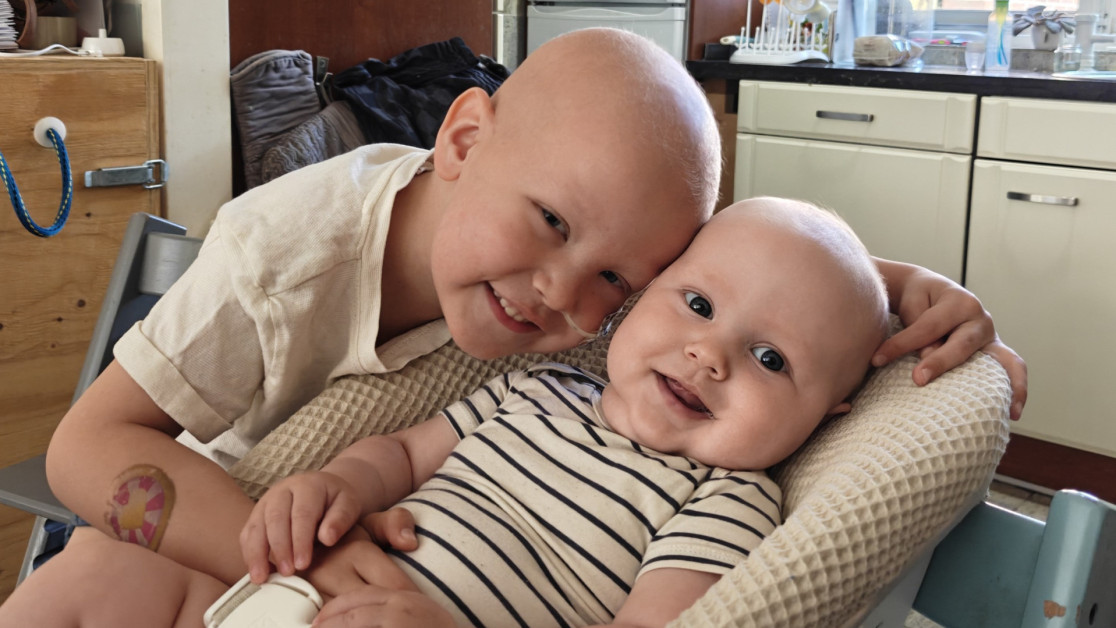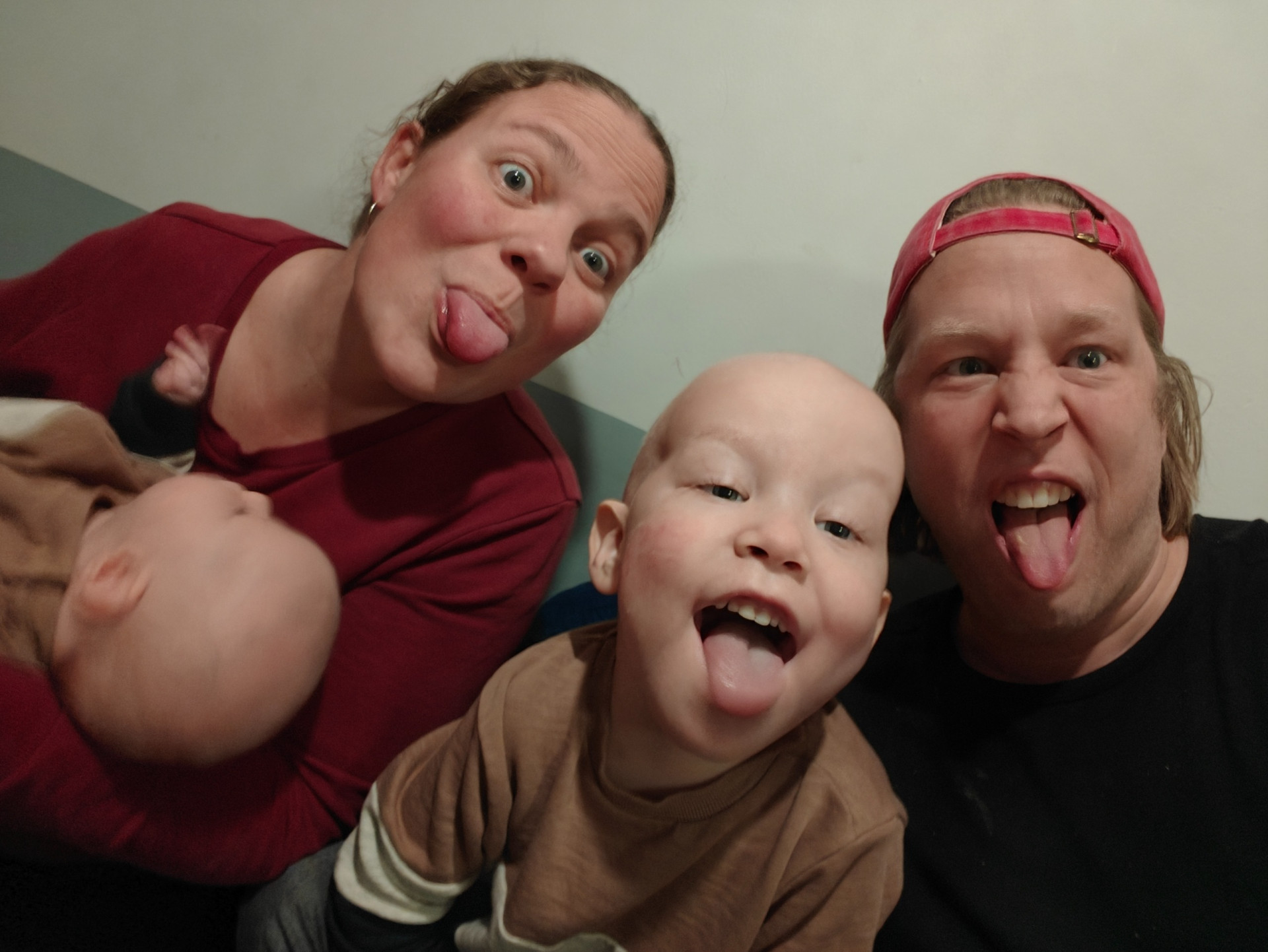
All the time and attention
Maartje says: ‘When Max had to get a feeding tube at the start of treatment, that was pretty scary. For him, but also for us. It really helped that a kind nurse took all the time we needed the day before. She showed us how the tube was placed and how everything worked. That made us feel more prepared and showed us how we, as parents, could support Max.’
Seen and heard
There’s also the psychologist, who helped Max so much with his fear of needles. And the ward doctor, who, at Maartje and Mario’s request, doesn’t sugarcoat things but tells it like it is. Or the child life specialist, with her listening ear. Maartje says: ‘When your child is this sick, there’s no better or kinder place than the Máxima.’
Naughty white blood cells
The focus, of course, is on Max’s treatment. Just before his fourth birthday, he was diagnosed with B-cell acute lymphoblastic leukemia (B-ALL). Or as he explains it: ‘Leukemia means you have naughty white blood cells.’ It started with pain in his knee; the normally active Max didn’t want to walk anymore. Mario says: ‘We thought it was from a fall while playing tag with his cousin.’ But after an awkward move at the dinner table, it became clear something else was going on. A small fracture in his wrist and a high fever brought them from the urgent care center to the hospital in Leiden. That’s where they first heard the word ‘leukemia,’ a diagnosis later confirmed at the Máxima.
A future swept away
Mario says: ‘I thought about all the things I wanted to teach Max later. Our whole picture of the future was wiped away in that moment.’ Max had to start treatment at the Máxima right away. At the same time, Maartje was 36 weeks pregnant. ‘How will I choose between being with my baby or my very sick child?’ she recalls of that frightening time. Luckily, a nurse reassured her: she could always bring the baby to the Máxima, and until he was a year old, he could even stay overnight in the parent-child room. ‘That brought so much peace of mind.’
Trust, familiarity, and uncertainty
Arriving at the Máxima, Maartje and Mario immediately felt a sense of trust. ‘We’re in the best place,’ says Mario. And also familiarity: ‘Every parent here is facing the same struggles.’ Still, there was fear and uncertainty. Not only was Max’s treatment about to begin, but his little brother was soon to be born. Meanwhile, the lives of Mick, Milan, and Maya were turned upside down: their days no longer revolved just around school and work, but around caring for their little brother and the many hospital visits.
Close together
On top of everything, Max also had the RS virus and had to be in isolation. Maartje spent those first days after the diagnosis mostly sitting close to him, heavily pregnant, together in the big white chair in the parent-child room. ‘That way I could really feel connected with the baby in my belly. With Max snuggled up against me, I could feel the baby turning or moving toward him. It was very special.’
Giving birth ‘across the street’
While Max’s treatment was starting, Maartje gave birth to baby brother Melle ‘across the street,’ at the Wilhelmina Children’s Hospital (WKZ). Mario says: ‘During the delivery I kept walking back and forth over the Rainbow Bridge: from our sick Max and sister Maya at the Máxima to Maartje, who was in labor.’ A surreal contrast, also for Maartje: thinking about Max while at the same time welcoming new life. And then he was there: Melle! Maartje says: ‘Amid all the worries about Max, I still felt so much joy and love for this little baby.’
Worries and bright moments take turns
The roller coaster of an intense postpartum period, treatments, medication side effects, and unexpected hospital stays brings a lot of stress and worry. Yet there are bright spots and support from many sides: a little friend who plays with Max and helps him through tough days, family and friends who organize a cooking app and bring meals, and at home, Maya and Milan proudly celebrate earning their diplomas.
Growing confidence
Max is now one-third of the way through the two-year treatment period. Step by step, their knowledge is growing and it feels good to be able to do more and more themselves at home. Mario says: ‘At first I checked five times whether I had given the twelve medications correctly; now it goes much more smoothly.’ There’s always the reassurance that they can call the Máxima with any question. ‘Even to ask whether Max could have a cotton candy at the fair.’
Keep laughing together
There’s also fun and room to enjoy life. Max is responding well to his treatment, rides his little bike through the Máxima, starts school, and proudly talks about his new backyard trampoline. Baby brother Melle is thriving and looks at the world with the same bright smile as his big brother.
Maartje says: ‘My advice to other parents: keep laughing together. I’ll never forget seeing a mom playing around with her child at the Máxima. That’s when I thought: that’s how I want to be for Max too. Enjoy the little moments.’ Mario adds: ‘And remember that you’re allowed to ask for help, whether it’s something practical or just to get something off your chest.’

Double the celebration
Around Max’s sixth birthday, they hope to celebrate double: not only his birthday but also the end of his treatment. Maartje says: ‘Of course it remains exciting; you never know how the rest of the treatment or his future will go. But I truly have faith. We stay positive. And above all: we do it together.’
View all stories
